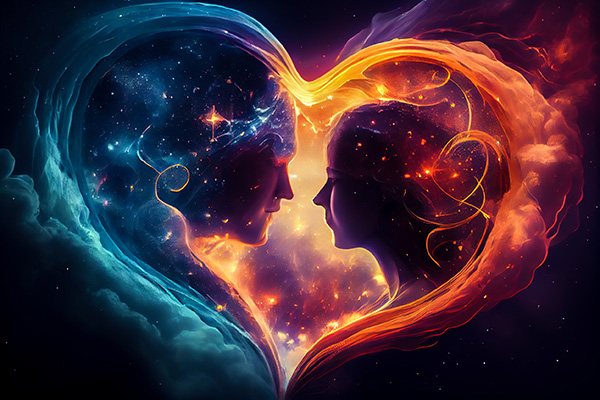emotional distress
The Unresolved Karmic Bonds Between Souls
 Have you ever found yourself thinking about an old friend or flame that you haven’t spoken to in years, and they suddenly show up in your life in the most unexpected place? This often happens when we are still energetically connected to someone.
Have you ever found yourself thinking about an old friend or flame that you haven’t spoken to in years, and they suddenly show up in your life in the most unexpected place? This often happens when we are still energetically connected to someone.
There are invisible energy cords that connect us to many different souls across dimensions and incarnations. These karmic connections are deep soul bonds that transcend time and space and span multiple lifetimes.
Those we love (or hate) – whether a partner or spouse, family members, friends – are all karmically connected to us.
Karmic connections aren’t easily severed. They also don’t simply disappear when we physically part ways in this world. These invisible cords keep us tied to those we’ve loved, lost, or even hurt—until we consciously choose to break free.
Karmic connections continue across lifetimes unless they are consciously severed and dissolved. But these energetic cords of attachment can be difficult to break. We may believe that a relationship is over on a logical level, but energetically the connection remains.
When betrayal or heartache occurs, an energy cord remains between the heart chakras of both individuals, often leading to a recurring cycle of pain and energy depletion due to these lingering connections.
Traumatic events, emotional or sexual attachments, promises, contracts and vows all create strong connections between souls. We often feel a sense of unfinished business when a promise or vow is broken or left unfulfilled.
The Mystical Healing Power Of Flowers
 If you were to walk into my garden in England, one of the first things you might notice is a beautiful hanging basket full of purple petunias. I put it there for a number of reasons, and not just to admire its beauty. No, it is where it is because of how it makes me feel.
If you were to walk into my garden in England, one of the first things you might notice is a beautiful hanging basket full of purple petunias. I put it there for a number of reasons, and not just to admire its beauty. No, it is where it is because of how it makes me feel.
The energy of flowers is metaphysically powerful and can help you achieve emotional and spiritual well-being. My purple petunias make me feel motivated and full of well-being.
Okay, this may seem like a bold statement, but flowers are truly magical in that they can help increase your productivity and overall happiness, soothe any sensitivities in your life, and motivate you at the same time. And yes, they can do this for you just by looking at them.
So, how do flowers work their magic on us? Mother Nature puts a lot of time and effort into creating beautiful flowers. In fact, a single flower can take weeks or even months to fully develop, making it the part of the plant with the highest energy vibration. When you work with such masterpieces of nature, you are indeed working with the most powerful and purest of energies.
Each flower carries its unique vibrational frequency, which interacts with our own energy fields. This interaction can lead to subtle yet profound changes in our mental, emotional and spiritual state. For example, the vibrant purple hue of petunias resonates with the crown chakra, enhancing our connection to higher consciousness and promoting a sense of peace and clarity. Similarly, the delicate structure and soothing colors of flowers like lavender can harmonize our energy, reducing stress and fostering relaxation.
Is Your Texting Pushing Him Away?
 A new client recently contacted me about a promising romantic relationship. The first thing that became clear as I began to read for her was that she had a long history of dating men who seemed like potential long-term partners, but then suddenly disappeared or broke up with her after only a few months.
A new client recently contacted me about a promising romantic relationship. The first thing that became clear as I began to read for her was that she had a long history of dating men who seemed like potential long-term partners, but then suddenly disappeared or broke up with her after only a few months.
It quickly also became clear to me that texting was a significant factor in her dating problems. Misunderstandings due to texting have damaged the romantic, family, and friendship relationships of many people I have worked with as a psychic professional. This client was no exception.
As I read the energy around her situation, I sensed that she had a tendency to push men away by unnecessarily panicking when she did not feel completely in control. Guys can sense panic and controlling tendencies and for most men this is usually a big turnoff.
This kind of negative energy is also stressful and doesn’t improve the outcome of an uncertain situation. Excessive obsession, panic, and worry will not bring someone closer to you; in fact, it can push a potential long-term relationship away forever.
I then had to tell her that while I did see the potential for a long-term relationship in their connection, I didn’t currently see a long-term future for them if she continued with all the texting she was doing. I told her to take a step back, breathe, stop worrying so much, and definitely not try to resolve things through texting any more.
Finding Your Strength And Peace In Difficult Times
 I’ve noticed many of my clients feeling as though the world is crumbling around them lately, unsure of how to navigate the chaos that surrounds them.
I’ve noticed many of my clients feeling as though the world is crumbling around them lately, unsure of how to navigate the chaos that surrounds them.
If this is true for you, then it is essential to remind yourself that the actions and choices of others do not define your path – it’s theirs to walk, not yours. Your focus should remain on your journey and how you can positively impact the world around you. Spirit has been very clear in its guidance in this regard.
Everyone has something in their soul that they need to release, move past and grow from or it will just karmically repeat itself in every lifetime. Let go of trying to fix other people or solve their problems and just move forward with your own life. Do not give your power away to anyone, for Source is with you and always wants you to keep your power.
If you find yourself constantly watching the news, engaging with negative content on social media, or dealing with recent grief from the loss of loved ones to suicide, terminal illness, or strained relationships, it’s time to take a step back and ground yourself.
Grief, stress, and anxiety can take a toll on your mental, emotional, and spiritual well-being. During these times, reconnecting with your spirituality and grounding yourself can provide comfort, strength, and a sense of peace. It is important that you do not let go of your inner power or allow the outside world to suck the life out of you.
Spiritual Practices To Improve Your Mental Health
 Mental health has become a critical focus for many in recent years. While traditional methods such as counseling, therapy, and medication are essential in addressing mental health issues, the mental health benefits of spirituality are often overlooked.
Mental health has become a critical focus for many in recent years. While traditional methods such as counseling, therapy, and medication are essential in addressing mental health issues, the mental health benefits of spirituality are often overlooked.
Everyone’s mental well-being is affected at some point by the challenges of modern life. It is common to feel out of balance when our world seems to be spinning out of control, or when it seems that we are not getting the things we most want in our lives.
Most people don’t realize that spiritual connection is essential to our mental health and facilitates well-being on all levels. Because mental health issues have such a low and heavy vibration, they make it difficult and sometimes impossible to feel the presence of God, Source, Spirit, the Divine in our lives.
But by working daily to establish a strong connection with your spirit guides and higher source, you are taking a powerful step toward freeing yourself from the grip of these inner demons and dark energies.
Spirituality in its various forms is a powerful way to connect with yourself and the world, fostering a deeper sense of inner peace and purpose for a more balanced and fulfilling life. Research clearly shows that various spiritual practices can significantly improve mental health. These practices offer complementary benefits to traditional mental health treatments, promoting emotional resilience, stress reduction, and overall psychological well-being.
Personally, I have found that spiritual practices such as prayer, meditation, and journaling give me greater access to guidance and support from the spirit realm and my guides. Our guides are a wonderful source of healing, guidance, and direction. Getting in touch with our guides can actually help us get out of a funk because they have the ability to set us free and empower us on every level.
Is Your ‘Friend’ A Toxic Energy Thief?
 Do you have a friend who constantly makes you feel unbalanced and drained, while adding no value to your life? We’ve all had that so-called ‘friend’ who doesn’t seem to care much about our well-being. Sometimes they don’t even seem to like us at all!
Do you have a friend who constantly makes you feel unbalanced and drained, while adding no value to your life? We’ve all had that so-called ‘friend’ who doesn’t seem to care much about our well-being. Sometimes they don’t even seem to like us at all!
They are that fair-weather friend who drains your energy and constantly exhibits toxic behaviors that destroy your inner peace, steal your joy, and disrupt your spiritual balance. Interacting with them increases your stress or anxiety, and even triggers a sense of disconnection from your true self.
If you have such a “friend,” consider this a serious wake-up call. After all, with a friend like that, who needs enemies? And if you have more than one such friend, consider this an urgent intervention!
The truth is that having an energy vampire masquerading as a friend in your life poses significant spiritual dangers and negative effects on your overall health and well-being.
Constant interaction with someone who is unkind and unsupportive hinders your personal and spiritual growth. Instead of uplifting and encouraging you, they serve only to hold you back and may even discourage you from pursuing your dreams. These people are not your friends.
It reminds me of the karate classes I used to take. We were taught to have ‘situational awareness.’ In karate, this refers to being fully aware of your surroundings, including potential threats, opportunities, and obstacles during training, sparring, or self-defense scenarios. It involves being mentally present and observing the environment, the opponent, and any relevant factors that could affect the outcome of a situation.
